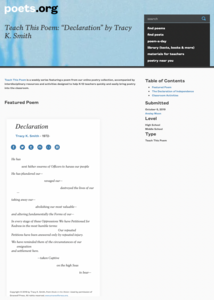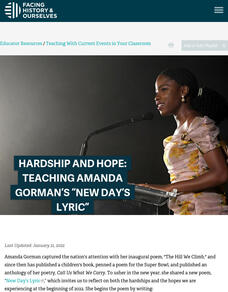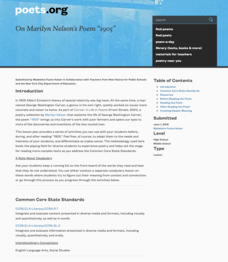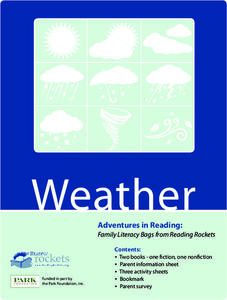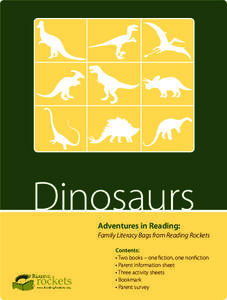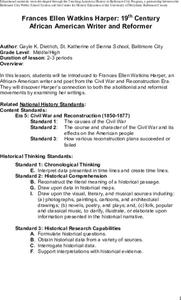Learning for Justice
Maya Angelou
Maya Angelou's poem, "Still I Rise", offers young scholars an opportunity to consider how poets use literary devices to create powerful messages. After a close reading and discussion of the poem, class members reflect on how they can...
Academy of American Poets
Teach This Poem: "A New National Anthem" by Ada Limón
Ada Limon's poem, "A New National Anthem," offers young scholars an opportunity to reflect on the significance of the US national anthem and the extent to which Key's vision applies to all Americans. After watching a video of Whitney...
Academy of American Poets
Teach This Poem: “Making History” by Marilyn Nelson
What makes an event newsworthy, worth a reference in a news magazine or textbook? Who decides? These are questions Marilyn Nelson asks readers of her poem "Making History" to consider. To begin, class members list details they notice in...
Academy of American Poets
Teach This Poem: “Declaration” by Tracy K. Smith
Tracy K. Smith's erasure poem "Declaration" challenges scholars to use their noticing skills to make connections between an engraving entitled "The Declaration of Independence" and Smith's poem. Class members record observations and...
Academy of American Poets
Teach This Poem: "A Place in the Country" by Toi Derricotte
Build young scholars' confidence in analyzing art and poetry with a lesson plan that first asks pupils to list details they notice in Edouard Vuillard's painting "Garden at Vaucresson" and then to describe how the painting makes them...
Academy of American Poets
Teach This Poem: "Imagine" by Kamilah Aisha Moon
A lesson about Kamilah Aisha Moon's poem "Imagine" asks young scholars to imagine, "What would happen if...?" If Dr. Martin Luther King's dream became a reality. If Renisha McBride was a white girl and crashed her car in a black...
Academy of American Poets
Teach This Poem: "Old South Meeting House" by January Gill O'Neil
The vaulted ceiling of the Old South Meeting House has heard many voices. Young scholars read an excerpt about its importance in American history and then do a close reading January Gill O'Neil's poem, "Old South Meeting House." After...
Facing History and Ourselves
Hardship and Hope: Teaching Amanda Gorman's "New Day's Lyric"
Class members come together to study Amanda Gorman's poem "New Day's Lyric." After a close reading of the poem, learners watch a video of Gorman reading her poem, and then craft additional lines for the poem where they offer suggestions...
Academy of American Poets
Teach This Poem: "On Being Brought from Africa to America" by Phillis Wheatley
Phillis Wheatley's poem, "On Being Brought from Africa to America" is the focus of a lesson that asks readers to consider how the poem is a critique of slavery. Groups comprise a list of words and phrases they notice as well as questions...
Academy of American Poets
Voice
Four lessons make up a poetry unit that introduces high schoolers to spoken and written poetry. Class members also examine poems as social commentary and connect these poems to various novels and plays. A great way to incorporate poetry...
Academy of American Poets
On Marilyn Nelson's Poem “1905”
Marilyn Nelson's poem, "1905," asks young scholars to compare and contrast George Washington Carver and Albert Einstein. After studying images of the two scientists and listing their observations, class members listen to several readings...
Academy of American Poets
Teach This Poem: "The Tradition" by Jericho Brown
To begin this lesson, class members examine Antonius Hockelmann's painting "Tree Flowers II," record elements of the painting that they notice, and share their observations with a partner. Next, pupils do a close reading of Jericho...
British Council
Litter Poem
What a load of rubbish! Using the resource, pupils listen to a poem about litter pollution and discuss the poem's language. After completing a worksheet about the poem, they write their own anti-litter poetry.
PBS
Reading Adventure Pack: Weather
A reading adventure pack, featuring a fiction and nonfiction book focuses on the weather. Scholars read Cloudy with a Chance of Meatballs by Judi Barrett and Seymour Simon and then complete three creative activities. Participants craft...
PBS
Reading Adventure Pack: Rocks
A Reading Adventure Pack focuses on rocks. Scholars participate in three activities after reading a fiction and nonfiction text—The Jade Stone, a Chinese folktale adapted by Caryn Yacowitz, and Rocks in His Head by Carol Otis Hurst....
PBS
Reading Adventure Pack: Dinosaurs
Two books—Dinosaurs by Gail Gibbons and Danny and the Dinosaur by Syd Hof—begin a learning experience in which scholars complete three creative, imaginative, and real-world activities. First, pupils create a puzzle featuring their...
Roald Dahl
George's Marvelous Medicine
Six lessons comprise a unit about Roald Dahl's George's Marvelous Medicine. Over time, scholars explore themes such as the power of words, exciting writing, and mixed feelings. They examine the writing's literary devices, persuasive...
Poetry4kids
Rhythm in Poetry: You Can Scan, Man
A detailed lesson written for budding poets challenges them to scan poems to discover stressed and unstressed syllables. Dashes and slashes highlight the syllables to count the feet, which makes the rhythm of the poem. Questions test...
Center for History Education
Frances Ellen Watkins Harper: 19th Century African-American Writer and Reformer
Although some African American abolitionists—such as Sojourner Truth and Frederick Douglass—are well known, others, like Frances Ellen Watkins Harper, remain in the shadows of history. Harper was a poet and activist who played an...
PBS
Discuss 22-year-old Amanda Gorman’s inaugural poem “The Hill We Climb”
Two poems by National Youth Poet Laureate Amanda Gorman are spotlighted in a PBS lesson. Young scholars conduct a close reading and watch videos of Gorman reading her inaugural poem "The Hill We Climb" and "The Miracle of Morning." They...
Academy of American Poets
Teach This Poem: “As I Walk These Broad Majestic Days” by Walt Whitman
Walt Whitman's poem "As I Walk These Broad Majestic Days" offers scholars an opportunity to practice their noticing skills. They first examine a postcard of the Newport News Shipyard listing things they notice about the image and how...
Academy of American Poets
Teach This Poem: "Spring is like a perhaps hand" by E. E. Cummings
E. E. Cummings' "Spring is like a perhaps hand" offers young scholars an opportunity to try their hands at analyzing a simile. After a warm-up activity and a close reading of the poem, class members discuss what they think the poem is...
Academy of American Poets
Teach This Poem: "Putting in the Seed" by Robert Frost
Young botanists dig into a lesson that has them planting lima bean seeds and observing their growth. They compare their experience to that of the speaker in Robert Frost's poem, "Putting in the Seed."
Academy of American Poets
Teach This Poem: "The Shapes of Leaves" by Arthur Sze
Arthur Sze's poem, "The Shapes of Leaves," encourages young scholars to notice and speak for others who "do not speak." The activity begins with pupils writing about a tree that they really like. The class then examines an image of...





